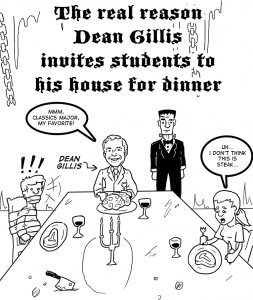On September 20, I browsed through devastating photographs of black smoke, dead bodies, and a destroyed hotel that had no resemblance to the Marriott I had stayed in two years earlier. As a junior in high school, I joined my father, American University Professor Akbar Ahmed—“the world’s leading authority on contemporary Islam,” according to the BBC—in his home country of Pakistan for two weeks, where he was doing research for his latest book. I followed my father as he interviewed President Musharraf, gave speeches, and conducted interviews. At night, we would return to our lavish hotel room in the Marriott in Islamabad. Although I did not realize it at the time, the hotel is eminent not only because of its extravagance, but because it neighbors the embassies of foreign dignitaries, the President’s office, and the parliament building. Perhaps most importantly, the Mariott serves as a symbol of corrupt Pakistani decadence and of the government’s unpopular alliance with the United States.
It is no shock, then, that it was the prime target of a terrorist attack. The bomb blast occurred when a truck rammed into the front gate of the highly secured hotel and blew up, leaving a 20-foot-deep crater and damaging the entire structure of the hotel. The building was aflame for hours, and a ten-mile radius of Islamabad felt the effects of the blast. Moona Shakil, a family friend who was in Islamabad at the time, told my family that windows and door locks of houses were shattered all around the city because of the explosion. Over 50 people were killed, and at least 100 were injured. Speculating about who was behind the attack, my father said that this was “a classic mode of revenge by tribal men, mostly likely from Pakistan’s North-West Frontier Province, linked to the Taliban. They believe that the Pakistani government, backed by the U.S., is attacking them. The Marriott served as a representation of the government, which the Taliban are against.”
The parents of my sister-in-law, Fatima, had planned to dine in the Marriott in Islamabad on the evening of the attack. Luckily, they changed their plans at the last minute to eat at a restaurant in the Marghala hills, a mountainous area about thirty minutes from Islamabad. As they ate dinner, the ground shook beneath them, and people dropped their plates in shock. Discussion around the table continued as people assumed it was an earthquake. But soon after, an announcement was made notifying patrons about the explosion. Fatima’s family rushed outside, and saw a cloud of black smoke rising over the district. Once it cleared, they saw a blaze of fire. Fatima was able to reach her parents as soon as she heard about the bomb, but she was still in shock at the terrifying possibilities.
Tragic events like the Marriott bombing have occurred since the creation of Pakistan in 1947. It seems that suicide bombings and tribal revolts are becoming more frequent and more devastating. President Asif Ali Zardari said in a televised speech, “This is a bad omen in our country. It is a cancer, which we will finish. We will not be scared of these cowards; we will not bow to these cowardly acts.” But Zardari, like Musharraf before him, is an expert at making hollow claims. Changing the Taliban’s views will require more than simply bombing them, which will only agitate the organization more and allow them to gain greater sympathy throughout the country. My father believes that the country’s civil service, which was destroyed by Musharraf, needs to be reestablished. He said that the “fall of the district administration and the establishment of the army left a vacuum especially in tribal areas that are hard to control.” Last year, I visited the North-West Frontier Province with my mother, a native of the region. Although there was a sense of order and stability in the area, it came largely from chieftains or village elders. If the government wants to prevent further attacks, they must follow this example by having direct control over the area through district officers who are accustomed to the local culture and traditions, so groups like the Taliban can work with them rather than oppose them.
Events like this remind us of America’s own tragedies, including the events of September 11th, 2001. Looking through the pictures of the bomb blast in Islamabad, I saw the same pain on the faces of wives who had lost their husbands, the same worry on the faces of mothers who tried urgently to find their children, and the same fear on the faces of citizens wondering when another strike would occur. I can only hope that images like these never appear again.





